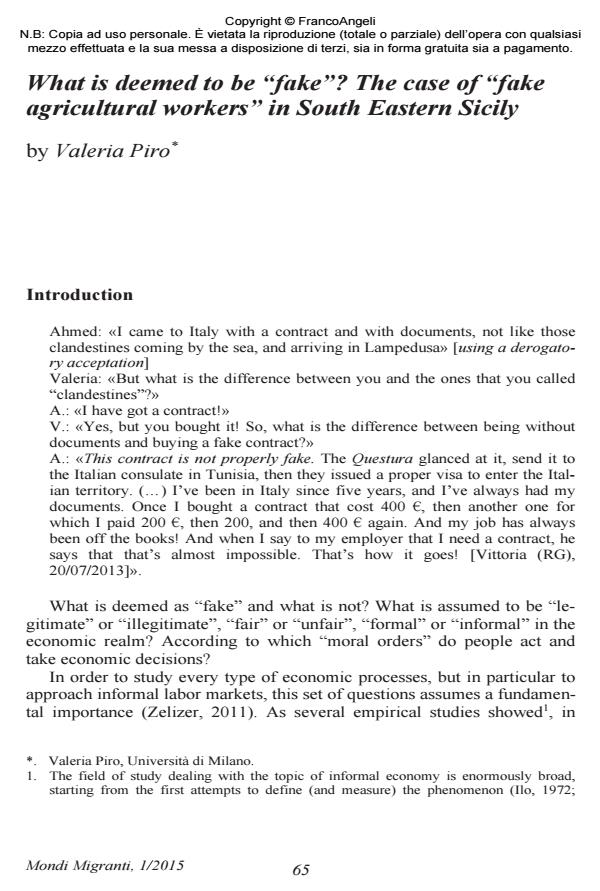What is deemed to be "fake"? The case of "fake agricultural workers" in South Eastern Sicily
Titolo Rivista MONDI MIGRANTI
Autori/Curatori Valeria Piro
Anno di pubblicazione 2015 Fascicolo 2015/1
Lingua Inglese Numero pagine 19 P. 65-83 Dimensione file 70 KB
DOI 10.3280/MM2015-001004
Il DOI è il codice a barre della proprietà intellettuale: per saperne di più
clicca qui
Qui sotto puoi vedere in anteprima la prima pagina di questo articolo.
Se questo articolo ti interessa, lo puoi acquistare (e scaricare in formato pdf) seguendo le facili indicazioni per acquistare il download credit. Acquista Download Credits per scaricare questo Articolo in formato PDF

FrancoAngeli è membro della Publishers International Linking Association, Inc (PILA)associazione indipendente e non profit per facilitare (attraverso i servizi tecnologici implementati da CrossRef.org) l’accesso degli studiosi ai contenuti digitali nelle pubblicazioni professionali e scientifiche
Throughout this article, the author deals with the topic of the moral economy of the informal labor market, focusing on the greenhouses' sector in the province of Ragusa (Sicily). The ethnographic experience as a participant observer in one of the richest districts of South Italian agriculture, helped to reconstruct the interplay emerging between the State, the entrepreneurs and the Italian and migrants laborers, harnessed in this quasi-informal system of production. The case of "fake agricultural workers", namely of people fictitiously hired in agriculture in order to receive the unemployment subsidy, represents an interesting example, since it allowed to scrutinize some of the categories, both cognitive and normative, that constitute the "moral order" of the agricultural local labor market. The author, thus, through several empirical examples, tried to rep to some relevant questions, like what is deem to be "legitimate" or "illegitimate" in the economic realm, what is constructed as "convenient" or "valuable" and how does ethnicity play a role in defining the "appropriateness" of individuals’ coping strategies.
Nel corso dell'articolo, l'autrice affronta il tema dell'economia morale nel mercato del lavoro informale, concentrandosi sul settore serricolo in provincia di Ragusa (Sicilia). L'esperienza etnografica da osservatrice partecipante in uno dei distretti più produttivi dell'agricoltura meridionale, ha aiutato a ricostruire le interazioni che emergono tra lo Stato, gli imprenditori e i lavoratori italiani e migranti, imbrigliati in questo sistema di produzione semi-informale. Il caso dei "falsi braccianti", ovvero di persone ingaggiate in maniera fittizia al fine di ricevere il sussidio di disoccupazione agricola, rappresenta un esempio interessante, poiché consente di indagare alcune categorie, di tipo sia cognitivo che normativo, che costituiscono "l'ordine morale" del mercato del lavoro agricolo locale. L'autrice, dunque, attraverso diversi esempi empirici, cerca di rispondere ad alcune domande rilevanti, come ad esempio cosa è ritenuto "legittimo" o "illegittimo" nell'ambito economico, cosa è costruito come "conveniente" o "valido", e in che modo l'etnicità gioca un ruolo nel definire le strategie d'azione più "appropriate".
Parole chiave:Economia morale, informalità, mercato del lavoro agricolo, falsi braccianti, lavoratori migranti, legittimità.
- Migrant Construction Workers in Times of Crisis Iraklis Dimitriadis, pp.63 (ISBN:978-3-031-18797-1)
- Violenza Politica Giuliana Sanò, Stefania Spada, pp.17 (ISBN:9788867057603)
- Employed but segregated: the exploitation of immigrant work in Mediterranean agriculture Maurizio Avola, in Journal of Modern Italian Studies /2022 pp.749
DOI: 10.1080/1354571X.2022.2040817 - Social reproduction in Sicily’s agricultural sector: migration status and context of reception Majella Kilkey, Domenica Urzi, in Journal of Ethnic and Migration Studies /2017 pp.2573
DOI: 10.1080/1369183X.2017.1286971 - Permanent Precarities: The Experience of Temporality of Tunisian Migrants in Sicily’s Transformed Agricultural Strip Andrea Calabretta, in Journal of International Migration and Integration /2025
DOI: 10.1007/s12134-025-01326-1
Valeria Piro, What is deemed to be "fake"? The case of "fake agricultural workers" in South Eastern Sicily in "MONDI MIGRANTI" 1/2015, pp 65-83, DOI: 10.3280/MM2015-001004